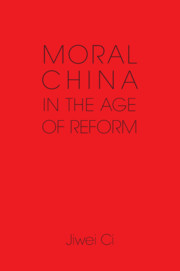Book contents
- Frontmatter
- Dedication
- Contents
- Acknowledgments
- Introduction
- 1 An Anatomy of the Moral Crisis
- 2 Political Order, Moral Disorder
- 3 Freedom as a Chinese Question
- 4 Freedom and Its Epistemological Conditions
- 5 Freedom and Identification
- 6 Neither Devotion Nor Introjection
- 7 The Insult of Poverty
- 8 Democracy as Unmistakable Reality and Uncertain Prospect
- 9 Freedom’s Unfinished Task
- 10 China’s Space of Moral Possibilities
- Index
- References
8 - Democracy as Unmistakable Reality and Uncertain Prospect
Published online by Cambridge University Press: 05 September 2014
- Frontmatter
- Dedication
- Contents
- Acknowledgments
- Introduction
- 1 An Anatomy of the Moral Crisis
- 2 Political Order, Moral Disorder
- 3 Freedom as a Chinese Question
- 4 Freedom and Its Epistemological Conditions
- 5 Freedom and Identification
- 6 Neither Devotion Nor Introjection
- 7 The Insult of Poverty
- 8 Democracy as Unmistakable Reality and Uncertain Prospect
- 9 Freedom’s Unfinished Task
- 10 China’s Space of Moral Possibilities
- Index
- References
Summary
1
After three decades of massive economic and social transformation, China has become a society in which democracy, like freedom, is both a limited reality and an unavoidable question for the future. It is precisely because democracy is already a limited reality, in a sense that I shall spell out in the course of my discussion, that we both can and should approach the question of democracy in China as a question immanent to Chinese society, as I have done with freedom (in Chapter 3). This means, in turn, that my first order of business must be to give a reasonably accurate characterization of the relevant aspects of Chinese society. Together such aspects make up a social reality – the kind of society China has become in the past three decades or so and is likely to remain in the foreseeable future – that will serve as my point of departure and return for thinking about the question of democracy. Indeed, I believe that once we have formed a reasonably accurate picture of this social reality, a good deal will follow from it, and the rest of the argument will be relatively easy; at the very least we will have a clearer sense of what we are talking and debating about at the level of fundamental political choices.
2
My reasons for this belief have to do with the question of the nature of normative reasoning. And my heightened awareness of the importance of this question is in turn prompted by the observation that democracy is a highly vexed question in China today and discussion of it all too often has, quite frankly, a hastily partisan character. I cannot pretend to be objective or impartial on so unavoidably evaluative and potentially polarizing a question. But there is much to be gained, both cognitively and politically, from taking a step back from the conflicting positions on democracy and making perspicuous what such positions are in conflict about, or should be understood to be in conflict about if they are to make good and significant sense. To this end, I want to propose a simple and, yet I hope, fruitful approach to thinking and debating about normative and political questions such as democracy.
- Type
- Chapter
- Information
- Moral China in the Age of Reform , pp. 156 - 181Publisher: Cambridge University PressPrint publication year: 2014



